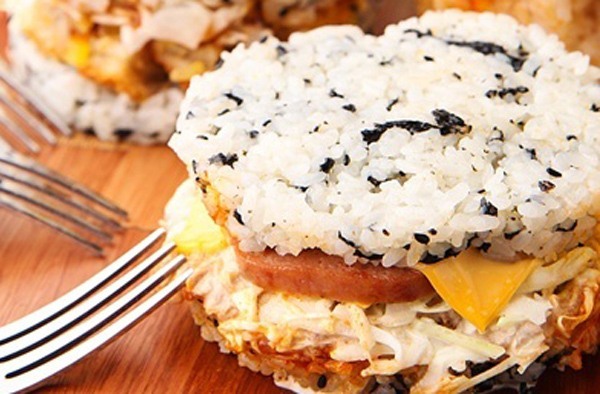A single portion of rice burgers contains almost half or more of a whole day’s sodium intake, sending a health warning to students and busy office workers who frequently enjoy such food at economical prices.
It consists of rice molded into the shape of buns with meat and other stuffing in between.
According to a survey conducted by the Seoul Metropolitan Government and Consumers Korea, some 50 types of rice burgers sold around schools and hagwon (cram schools) in Seoul have an average of 910.7 milligrams of sodium, almost half of the recommended daily intake for sodium set by the World Health Organization.
 |
A rice burger, consisting of rice molded into the shape of buns with meat and other stuffing in between, is a popular food item among students in Korea. (Real Foods) |
The WHO recommends an average sodium intake of 2,000 mg per day, as an excessive amount could raise blood pressure and pose health risks.
In general, Koreans consume 3,400 mg of sodium daily, almost 1.5 times the recommended daily intake. Separate studies showed that most Koreans’ daily sodium intake comes from dining out instead of cooking and eating at home. Of their total sodium intake, about 12 percent came from kimchi.
There are a variety of rice burgers, ranging from those made with bulgogi to those with kimchi, diced ham, spicy pork and other fillings. However, the one made with diced ham has the highest sodium content, at 1,736.3 mg, or 86.8 percent of the recommended daily intake amount.
The report said that 17 out of 50 rice burger stores included in the survey sold rice burgers with at least 1,000 mg of sodium content.
The report also said most of these rice burger stores did not list basic nutrition information on their menus, making it difficult for consumers to become aware of the high sodium content of their food.
Currently, the Special Act on Safety Management of Children’s Dietary Lifestyle stipulates that a restaurant franchise that has over 100 local stores and which sells food popular among children -- such as bakery products, hamburgers and pizzas -- should provide nutrition information to consumers. But rice burgers or kimbap are excluded from this category of food.
The city government stressed that the authorities should require more food chains to provide nutrition information so young consumers know what they are eating. They also recommended food chains to standardize their recipes, so consumers can avoid food with high sodium content.
“We will continue to conduct regular monitoring on food enjoyed by children and students, while discussing ways for consumers to find nutrition information helpful to maintaining a balanced diet,” said Na Baek-ju from the Seoul City’s Citizens’ health bureau.
By Kim Da-sol (
ddd@heraldcorp.com)








![[Today’s K-pop] Blackpink’s Jennie, Lisa invited to Coachella as solo acts](http://res.heraldm.com/phpwas/restmb_idxmake.php?idx=644&simg=/content/image/2024/11/21/20241121050099_0.jpg)